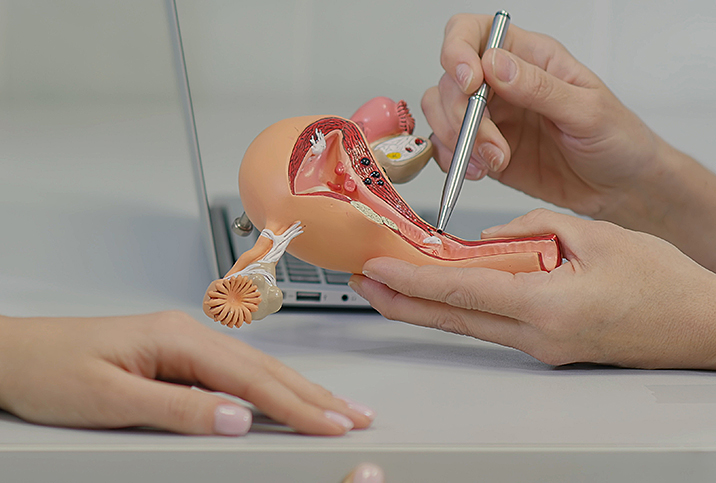Sex During Ovarian Cancer

Being diagnosed with ovarian cancer can turn your life upside down.
Ovarian cancer treatment can take some time, and living with it can affect all aspects of your life. Not only will you feel the symptoms of the condition itself, but the side effects of treatment can be debilitating for you and those around you.
Ovarian cancer doesn't just affect your body, it also affects your lifestyle, mental well-being and relationships. With all the changes ovarian cancer will bring, you may have some questions about how your sex life will change. Your sex life during ovarian cancer might not look like it did before, but that doesn't mean the end of your sexuality.
Sex After Diagnosis
It's helpful to have open communication with your doctor about what happens after being diagnosed with ovarian cancer. Conversations with doctors are often limited to treatment plans, but what can you expect in your personal life? How will cancer change your lifestyle? As your life changes, your relationships will be affected–including your sexual relationships.
If you're someone who enjoyed sex before being diagnosed with ovarian cancer, it's worth asking your doctor how your sex life will be affected moving forward.
Here are some questions you can ask:
- Will treatment affect my sex life?
- Is it safe to have sex now? During treatment?
- Is there any kind of sex I should avoid?
- Should I use contraceptives or any other forms of protection during treatment? After treatment? For how long?
Many people feel embarrassed talking about sex, so it may be awkward to ask your doctor. But if you're reading this, then sex is probably important to you, and no matter who you are, you deserve to have answers about how your sex life will change. And, please remember that your doctor has heard it all before.
You might have to rethink what sexual pleasure means to you and your partner. There may be times during and after treatment where the kind of sex you and your partner enjoy may not be realistic. Be open with your partner about what ovarian cancer will mean for your relationship and your sex life. If you feel comfortable, have your partner come with you to discuss the diagnosis with your doctor.
Sexual Intimacy During Treatment
You may need chemotherapy, radiation therapy, surgery or a combination of all three. Different treatments will affect you and your sex life in various ways.
Chemotherapy
Depending on the stage and type of ovarian cancer, your doctor may administer chemotherapy intravenously or inject it into your abdomen. The type of chemotherapy drugs you'll receive depend on how severe your condition is, which will affect how long your treatment lasts.
There's a wide variety of chemotherapy drugs, but the usual side effects include nausea and vomiting, fatigue, increased risk of infection, hair loss, bruising and weight fluctuations.
You may experience mouth sores and vaginal dryness, so while oral sex may be off the table, vaginal sex doesn't have to be. Women who experience vaginal dryness still lead active sex lives using lubricants. You and your partner can experiment with different kinds of lubricants, but be sure to do your research on which lubes are right for you.
Radiation Therapy
The most common radiation therapy for women with ovarian cancer is external beam radiation. It's a lot like getting an X-ray, but stronger. The radiation is focused on the area that's been affected by cancer.
Radiation therapy, of course, comes with side effects such as changes to your skin (blistering or a sunburned look), fatigue, diarrhea and vaginal irritation. The radiation can cause your vagina to feel tender and even appear swollen. Treatment can also cause the lining of your vagina to become thin, which can lead to light bleeding during and after sex.
While it may not sound pleasant, it's not impossible or unsafe to have sex during radiation therapy. You'll need to talk with your doctor about any necessary precautions, but so long as you feel good and aren't heavily bleeding, sex can be on the menu.
Surgery
Surgery is the most common treatment for ovarian cancer. Typically, one or both ovaries are removed, which can lead to lower estrogen levels. That can result in a lower sex drive.
If the cancer is aggressive, you may need to have your fallopian tubes, uterus and/or cervix removed. Cervix removal can shorten your vaginal canal and sometimes lead to painful sex. It can also affect how easily you achieve orgasm. The loss of your ovaries and uterus also means early menopause if you've not reached menopausal age.
While the ovaries are not something inherently sexual, cancer, as well as treatment to any part of your sexual reproductive system, will affect your sex life. Take some time to learn more about your body and how it works and don't be afraid to be an advocate for an important part of your quality of life.

















